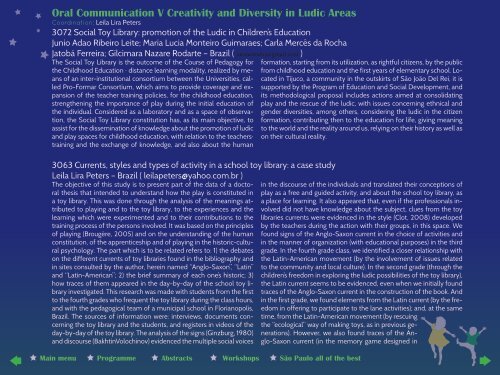Programa completo do Congresso - Associação Brasileira de ...
Programa completo do Congresso - Associação Brasileira de ...
Programa completo do Congresso - Associação Brasileira de ...
Create successful ePaper yourself
Turn your PDF publications into a flip-book with our unique Google optimized e-Paper software.
Oral Communication V Creativity and Diversity in Ludic Areas<br />
Coordination: Leila Lira Peters<br />
3072 Social Toy Library: promotion of the Ludic in Children’s Education<br />
Junio Adao Ribeiro Leite; Maria Lucia Monteiro Guimaraes; Carla Mercês da Rocha<br />
Jatobá Ferreira; Gilcimara Nazare Rodarte – Brazil ( junioemufsj@gmail.com )<br />
The Social Toy Library is the outcome of the Course of Pedagogy for<br />
the Childhood Education distance learning modality, realized by means<br />
of an inter-institutional consortium between the Universities, called<br />
Pro-Formar Consortium, which aims to provi<strong>de</strong> coverage and expansion<br />
of the teacher training policies, for the childhood education,<br />
strengthening the importance of play during the initial education of<br />
the individual. Consi<strong>de</strong>red as a laboratory and as a space of observation,<br />
the Social Toy Library constitution has, as its main objective, to<br />
assist for the dissemination of knowledge about the promotion of ludic<br />
and play spaces for childhood education, with relation to the teachers<br />
training and the exchange of knowledge, and also about the human<br />
3063 Currents, styles and types of activity in a school toy library: a case study<br />
Leila Lira Peters – Brazil ( leilapeters@yahoo.com.br )<br />
The objective of this study is to present part of the data of a <strong>do</strong>ctoral<br />
thesis that inten<strong>de</strong>d to un<strong>de</strong>rstand how the play is constituted in<br />
a toy library. This was <strong>do</strong>ne through the analysis of the meanings attributed<br />
to playing and to the toy library, to the experiences and the<br />
learning which were experimented and to their contributions to the<br />
training process of the persons involved. It was based on the principles<br />
of playing (Brougère, 2005) and on the un<strong>de</strong>rstanding of the human<br />
constitution, of the apprenticeship and of playing in the historic-cultural<br />
psychology. The part which is to be related refers to: 1) the <strong>de</strong>bates<br />
on the different currents of toy libraries found in the bibliography and<br />
in sites consulted by the author, herein named “Anglo-Saxon”, “Latin”<br />
and “Latin-American”; 2) the brief summary of each one’s historic; 3)<br />
how traces of them appeared in the day-by-day of the school toy library<br />
investigated. This research was ma<strong>de</strong> with stu<strong>de</strong>nts from the first<br />
to the fourth gra<strong>de</strong>s who frequent the toy library during the class hours,<br />
and with the pedagogical team of a municipal school in Florianopolis,<br />
Brazil. The sources of information were: interviews, <strong>do</strong>cuments concerning<br />
the toy library and the stu<strong>de</strong>nts, and registers in vi<strong>de</strong>os of the<br />
day-by-day of the toy library. The analysis of the signs (Ginzburg, 1980)<br />
and discourse (BakhtinVolochínov) evi<strong>de</strong>nced the multiple social voices<br />
formation, starting from its utilization, as rightful citizens, by the public<br />
from childhood education and the first years of elementary school. Located<br />
in Tijuco, a community in the outskirts of São João Del Rei, it is<br />
supported by the Program of Education and Social Development, and<br />
its metho<strong>do</strong>logical proposal inclu<strong>de</strong>s actions aimed at consolidating<br />
play and the rescue of the ludic, with issues concerning ethnical and<br />
gen<strong>de</strong>r diversities, among others, consi<strong>de</strong>ring the ludic in the citizen<br />
formation, contributing then to the education for life, giving meaning<br />
to the world and the reality around us, relying on their history as well as<br />
on their cultural reality.<br />
in the discourse of the individuals and translated their conceptions of<br />
play as a free and gui<strong>de</strong>d activity, and about the school toy library, as<br />
a place for learning. It also appeared that, even if the professionals involved<br />
did not have knowledge about the subject, clues from the toy<br />
libraries currents were evi<strong>de</strong>nced in the style (Clot, 2008) <strong>de</strong>veloped<br />
by the teachers during the action with their groups, in this space. We<br />
found signs of the Anglo-Saxon current in the choice of activities and<br />
in the manner of organization (with educational purposes) in the third<br />
gra<strong>de</strong>. In the fourth gra<strong>de</strong> class, we i<strong>de</strong>ntified a closer relationship with<br />
the Latin-American movement (by the involvement of issues related<br />
to the community and local culture). In the second gra<strong>de</strong> (through the<br />
children’s free<strong>do</strong>m in exploring the ludic possibilities of the toy library),<br />
the Latin current seems to be evi<strong>de</strong>nced, even when we initially found<br />
traces of the Anglo-Saxon current in the construction of the book. And<br />
in the first gra<strong>de</strong>, we found elements from the Latin current (by the free<strong>do</strong>m<br />
in offering to participate to the lane activities); and, at the same<br />
time, from the Latin-American movement (by rescuing<br />
the “ecological” way of making toys, as in previous generations).<br />
However, we also found traces of the Anglo-Saxon<br />
current (in the memory game <strong>de</strong>signed in<br />
Main menu Programme Abstracts Workshops São Paulo all of the best


